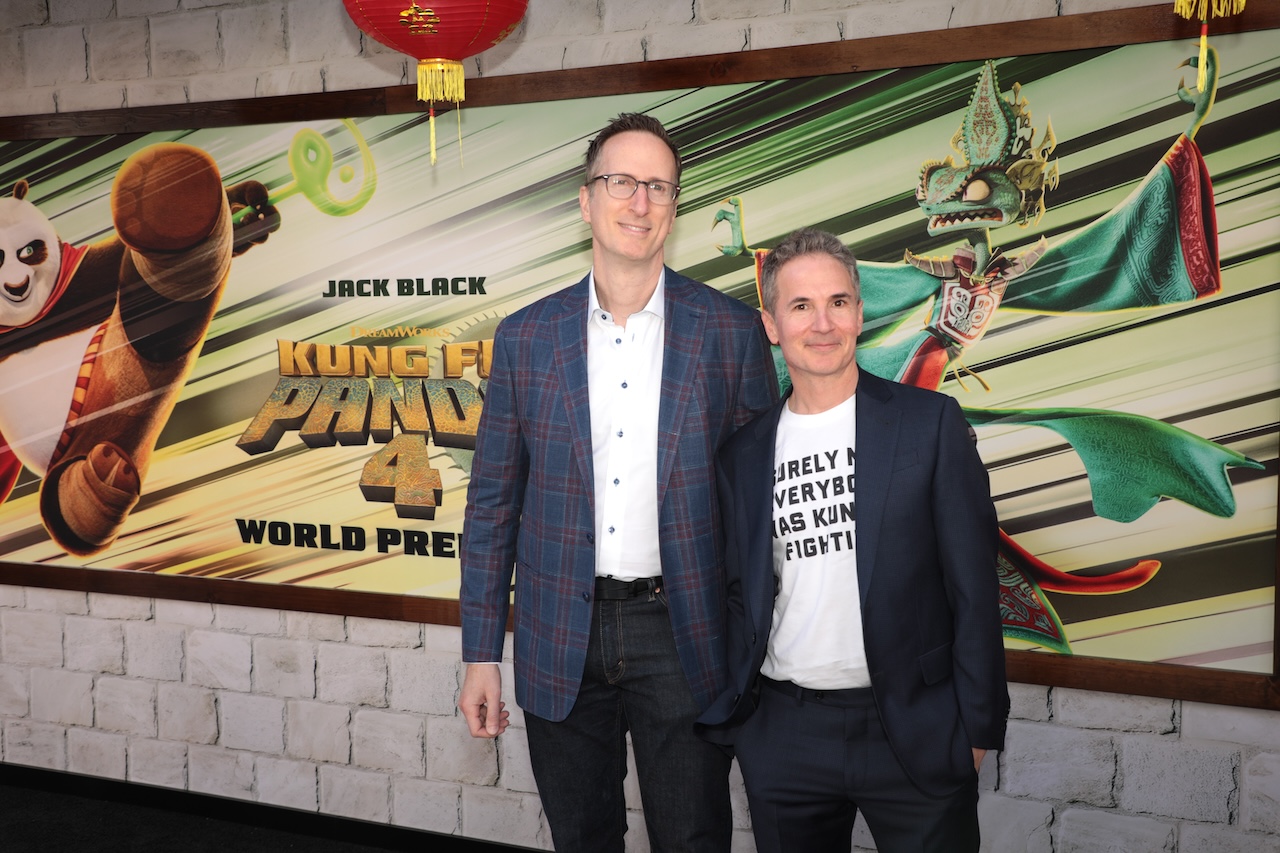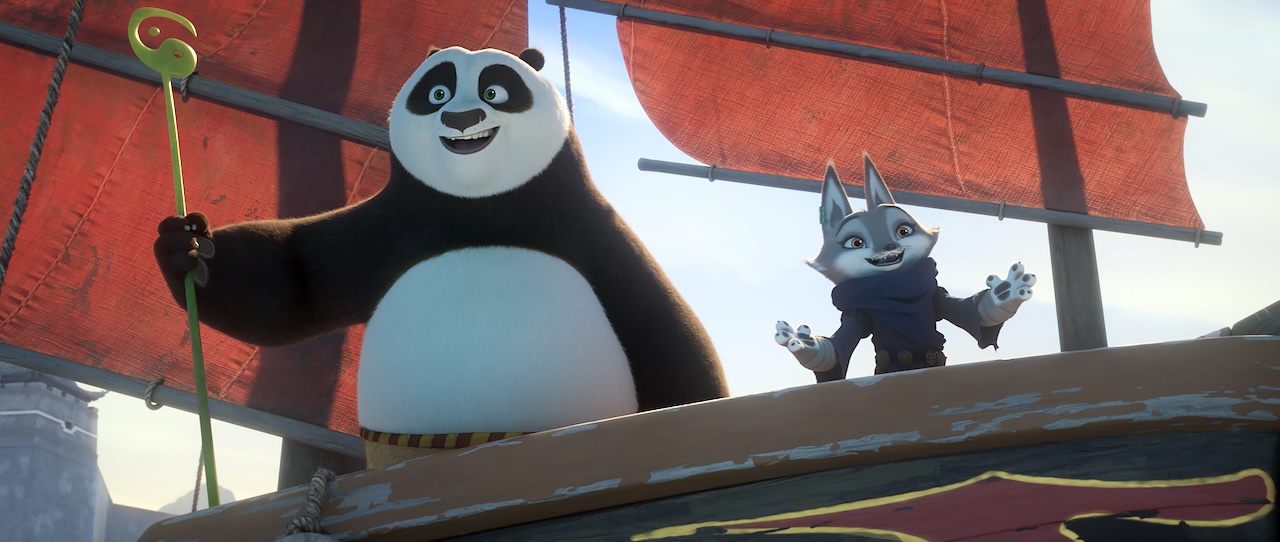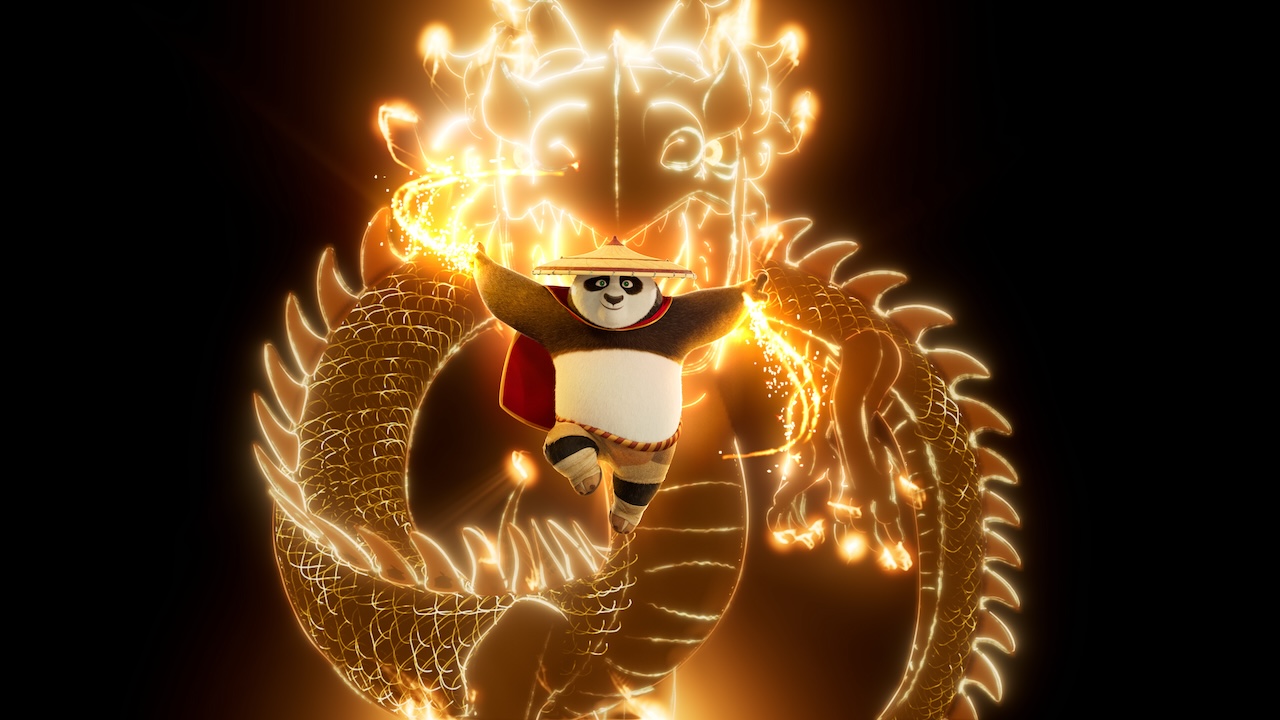After three high-kicking adventures, Kung Fu Panda has returned in its fourth outing – this time with Po Ping (Jack Black) being summoned by Master Shifu (Dustin Hoffman) to become the new spiritual leader of the Valley Of Peace. However, he must find his Dragon Warrior successor. Where does Po even begin?
Screenwriters Jonathan Aibel and Glenn Berger have been co-writing the martial arts “wuxia” action comedy Panda franchise since its inception and have continued propelling Po and his family and friends into martial arts cinema history. The writing duo spoke to Creative Screenwriting Magazine about their dedication to the franchise.
Glenn Berger was initially motivated by the original Shogun which sparked his interest in Asia and the martial arts as a whole. He started taking language and kung fu classes to expand his interest in Asian culture.
Berger and Aibel began their writing careers as television writers on shows like King Of The Hill. They tried breaking into the feature world for many years and wrote many scripts that didn’t get produced.
Their big break came in the form of Kristine Belson who once worked for The Jim Henson Company. She reached out to them informing them they were considering doing a Muppet movie. The pair imagined a “Crouching Tiger Hidden Dragon Muppets Kung Fu movie.”
Belson invited them to a screening of Kung Fu Hustle starring Stephen Chow to introduce them to her intentions. “That movie blew our minds because it felt like the first real modern fusing of comedy and martial arts films,” explains Berger. After some career moves, Belson wound up at Dreamworks, so a martial arts Muppet movie was no longer in consideration. Soon enough, Belson resurrected the idea of Kung Fu Panda and Jack Black was very excited to star as Po’s voice.

Glenn Berger and Jonathan Aibel. Photo by Alex J. Berliner/ AB Images
Jonathan Aibel was equally excited about this opportunity which changed the trajectory of their careers. He also notes that writers rarely initiate studio movies, particularly animated ones. They are hired to provide creative input and execute an idea. Panda was the perfect opportunity for them to express their love of kung fu in an animated film.
Kung Fu Panda is still a box office darling, yet Aibel and Berger admit they have no sprawling plans for the franchise and haven’t planned any future movies. A Dreamworks chief famously said there are six movies in the Panda canon, but the writers aren’t aware of them.
“We were kicking around future ideas, but it wasn’t until the movie came out that people kept asking about Po and his adoptive dad Mr. Ping (James Hong) and that relationship. That was at the point where we realized that sometimes the audience tells you what the most intriguing part is,” adds Aibel.
“You see what resonates. I think that’s what led to the second Panda movie so now we know the story of how Po got to his father. But what happened to Po’s panda family? You start exploring that, so it it really is about letting it unfurl, and if you know the franchise well enough, then you’re always looking for ways to see how that could have connected to what happened in the first movie, so that it all feels like a distinct universe.”
Glenn Berger refers to his tenure on writing on multiple seasons of King Of The Hill to expand the “Panda-verse.” He loves staying with characters you love and watching them grow over time. As audiences get to know the characters better, their jokes and nuances are more character-driven, rather than being a joke on the face of it.
In television, the rate of writing is much faster, so every single episode might not pop as much as a few jewels in the season. An animated film takes three to four years to produce, so the writers have more time to organically develop the storyline. The pair have watched Po and family grow over fifteeen years.
Berger feels that King Fu Panda offers him the best of both the film and TV worlds in the writing.
Cultural Appropriation vs Cultural Appreciation
Kung Fu Panda is built on the popularity of Wuxia – a form of ancient Chinese literature centering on martial arts and chivalry. Berger and Aibel knew the form and even consulted experts to ensure it was as authentic and respectful as possible on film. After the first movie was released, they visited China to gauge people’s reactions. Many Chinese felt honored at how their culture was accurately represented.
“I don’t know if it’s borrowing, but to appreciate another culture has a beauty in being able to make an American movie that celebrates it. It also is combining genres in the way Po brings a certain sensibility to it versus what Jackie Chan brings to the martial arts genre,” states Aibel.
“I think that’s part of the message of the movie where you have an adoptive goose dad and a panda son to get a merging and a getting along of different cultures.” There wasn’t an intention to “westernize” Chinese culture, but rather, to make it more accessible to global audiences.
Adds Berger, “I think the greatest satisfaction we had after the first movie came out was the New York Times article that talked about how in China they were soul searching about how westerners made a movie like this. That was really gratifying because it felt like that was a validation that we did accomplish what we were hoping to do.”
Creating A Kung Fu Panda Franchise
Building a successful film franchise requires the constant awareness of balancing a series of sequels which must be viewed in order to make sense with writing standalone films.
“I guess that’s always the challenge that each movie needs to stand on its own and also build on the movies that came before it,” declares Aibel. Although the writers avoided the latter, they don’t want to repeat elements of the same story throughout the sequels for the audience can keep track of the timeline.
“You can’t tell the same story multiple times because you want to introduce new characters and the world starts getting very full,” he continues. Since animated movies take so many years to make (six in this case), there’s enough time for experimentation. Sometimes you miss a character from an earlier film and bring them back, or pull back on another character with too much screen time. Jonathan Aibel doesn’t want a situation where Po and his friends go on a different adventure in each film to make the movies feel episodic.
Kung Fu Panda balances its dominant themes of action and spirituality; movement with stillness; comedy with drama. But each movie has a spiritual core to align all of them into unified whole.

Po (Jack Black) and Zhen (Awkwafina). Photo courtesy of Dreamworks Animation
“I think the heart of the franchise has always been Po’s struggle to feel that who he is is good enough. From the first movie, he thought he had to change in order to succeed. And then, the secret ingredient of nothingness was him realizing, ‘I have everything I need. It’s all within me,’” says Aibel. “We’ve always been finding different variations of that story.”
Part of Po’s bumbling attraction is his constantly doubting of his abilities and then surprising himself when he succeeds. Po’s naïveté is used to full comical effect when he doubts how he can defeat an evil peacock genius like Zhen (Awkwafina). She believes his lack of action is some brilliant strategy designed to thwart her.
Even when he meditates, he’s still capable of negative self talk no matter how much he’s accomplished.
Po is no idiot student. Master Shifu has trained him well and he realizes there is a time to fight and a time to retreat.
Kung Fu Panda 4 is mindful of its pacing and not bombarding the audience with too many action scenes. “One of our great screenwriting traits is to put people on boats or covered wagons, or anything moving, because you’re giving the story momentum… they’re going somewhere, but at the same time, you’ve bought yourself moments for the characters to connect… because without those moments it’s just a fighting movie and you don’t really care who wins or loses,” claims Aibel.
Entertaining A Family Audience
Although Kung Fu Panda 4 is billed as a family film, Aibel and Berger don’t deliberately write with marketing demographics in mind. They are conscious of telling a story on two levels so it’s accessible to everyone. Ultimately, they write what amuses them. As each draft progressed, additional sight gags and physical comedy were layered into the story.
“I think the gift of the Po as a main character is that he’s a man child, so he’ll play as not a child, but to his desires, his insecurities and his childlike impulses,” states Berger. Even though Panda is a coming of age story, Po always retains elements of his childishness and playfulness.
Po’s a character who can embody both very sophisticated spiritual delayed aspirations and very real childish impulse control issues
“Who you are right now doesn’t necessarily define who you will be for the rest of your life. We’re all capable of growth and change. Po thought he was going to be stuck as a noodle guy although what he really wanted to be was a kung fu warrior.”
Po stuns his community when he choses Zhen to be his Dragon Warrior successor with a leadership maturity not even he fully comprehends. She’s something of a street urchin yearning for something more in life. Po sees what others can’t in her. It’s moments like these where Po’s playfulness makes it unclear whether he’s an idiot or a genius, child or adult.
Screenwriter Darren Lemke also shares a writing credit for earlier drafts of the film. Glenn and Jonathan have known Darren for years and he worked with director Mike Mitchell on Shrek 4. So, it was an informal collaboration of mutual respect when he contributed to Kung Fu Panda 4.
The very early drafts of King Fu Panda 4 co-written with Lemke told the same basic story with certain structural differences. “The middle part of it was more a ‘David Mamet’ con movie so Zhen was preying on Po’s trusting nature and introduced him to the city with a bunch of other criminals,” says Glenn.
Po eventually realizes that she’s a con artist and he uses these con elements to enter the Chameleon’s (Viola Davis) palace. Dreamworks believed that the David Mamet references might be missed by younger audiences. So, some of these scenes were rewritten to align with Po’s mission to become a spiritual leader. “Darren’s biggest contribution was cleaning out the con and turning it more into a western.”
Jonathan Aibel and Glenn Berger ultimately believe that much of Po’s journey comes down to him doing his best regardless of the final result. “We’ve written a lot of movies with characters who are searching for the thing that will make them amazing, and in the end, there’s no magic other than being the best version of yourself.”
“We’re never that drawn to movies where someone undergoes magic and actually becomes someone else because that’s a fantasy.”
[More: Justin Marks & Rachel Kondo Discuss Their Stunning Adaptation Of Shogun]
